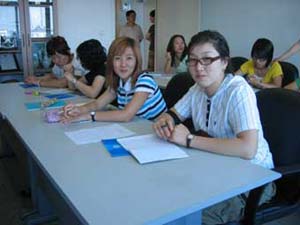|
In Asia, Mandarin is on the rise
(CRI)
Updated: 2006-01-13 19:43
Inside a brightly painted classroom, a circle of kindergarten kids sits facing their teaching assistant, a Filipina. "So what kind of present do you want from Santa?" she asks in English. "Do you want a toy? Who likes Barbie?" Some of the girls stick up their hands.

Korean students study at a Chinese language institute in Tianjin. Across Asia, Mandarin is making gains. [tjutcm.edu.cn] |
"We also have a Barbie for boys. What's he called?" the teacher continues. Several voices overlap, all speaking in English. "Ken!" "I want boy Barbie!" "I too want, miss!" After the hubbub subsides, the day's lesson begins: The sound made by the letters Q and U.
Next door, another group of preschoolers is playing a game. Their profile is identical under 5, over 90 percent Thai. But the teacher is Taiwanese, the language being spoken is Mandarin, and the classroom décor is Chinese.
After recess, the children will swap places and switch languages. When school is over, pupils revert to speaking their mother tongue. The next day, it's back to the immersion classes in English and Chinese.
Welcome to the cutting edge of Thailand's flirtation with Chinese, an ancient language increasingly seen as the new dialect of diplomacy and trade in East Asia. In the last few decades, China's economic rise has rippled across the globe, jolting policymakers and dazzling investors.
In its wake, Mandarin is also making gains.
Just as the US leveraged its superpower status to promote its language and culture, Beijing is busy exporting its tongue. It may lag behind English as a global language, but there's no doubting its rising appeal, especially in Asia.
Thailand hasn't turned its back on English: It's still compulsory in public schools, and likely to remain so. But starting from this year, thousands of schools will introduce Chinese as a foreign language, with a target of enrolling 30 percent of all high school students in programs within five years.
"There's been a lot of interest among parents as well as students to learn the Chinese language," says Khunying Kasama Varavarn, permanent secretary at the Ministry of Education. "We hope to establish at least one secondary school offering Chinese in every province."
Wanted: 100 million Mandarin learners
Thailand is counting on support from Beijing, which has promised to train more Thai language teachers, send native speakers to work in Thai schools, and provide free teaching materials.
China is already supporting language training in dozens of countries and reportedly has set a target of raising the number of foreigners studying Mandarin around the world to 100 million by 2010. Currently, more than 30 million people worldwide are studying Mandarin, according to the Chinese news service Xinhua.
Since 2004, China's Education Ministry has opened language centers called Confucius Institutes in over 20 countries, including South Korea, Australia, Singapore, Sweden, and Kenya.
In 2004, 110,844 foreigners from 178 countries were studying Mandarin in China, says Xinhua, up 43 percent on 2003. In Southeast Asia, private language schools in Malaysia and Indonesia report rising enrollment in Chinese classes, according to Knight Ridder.
|